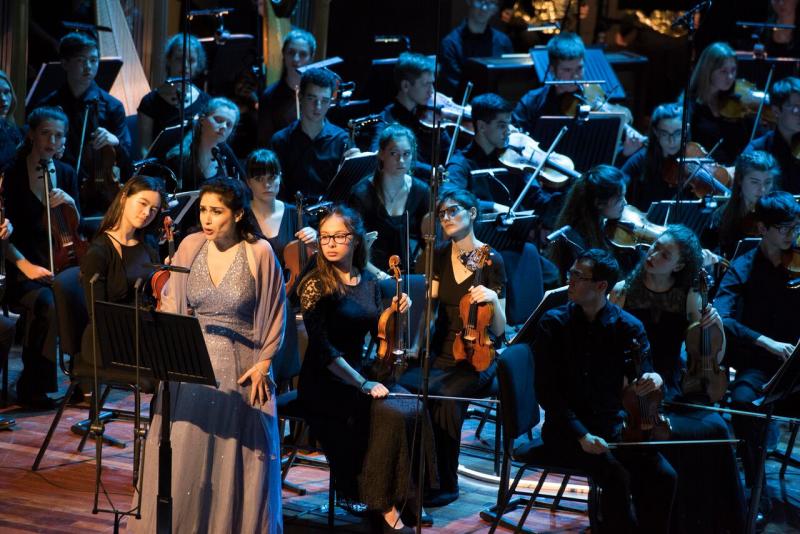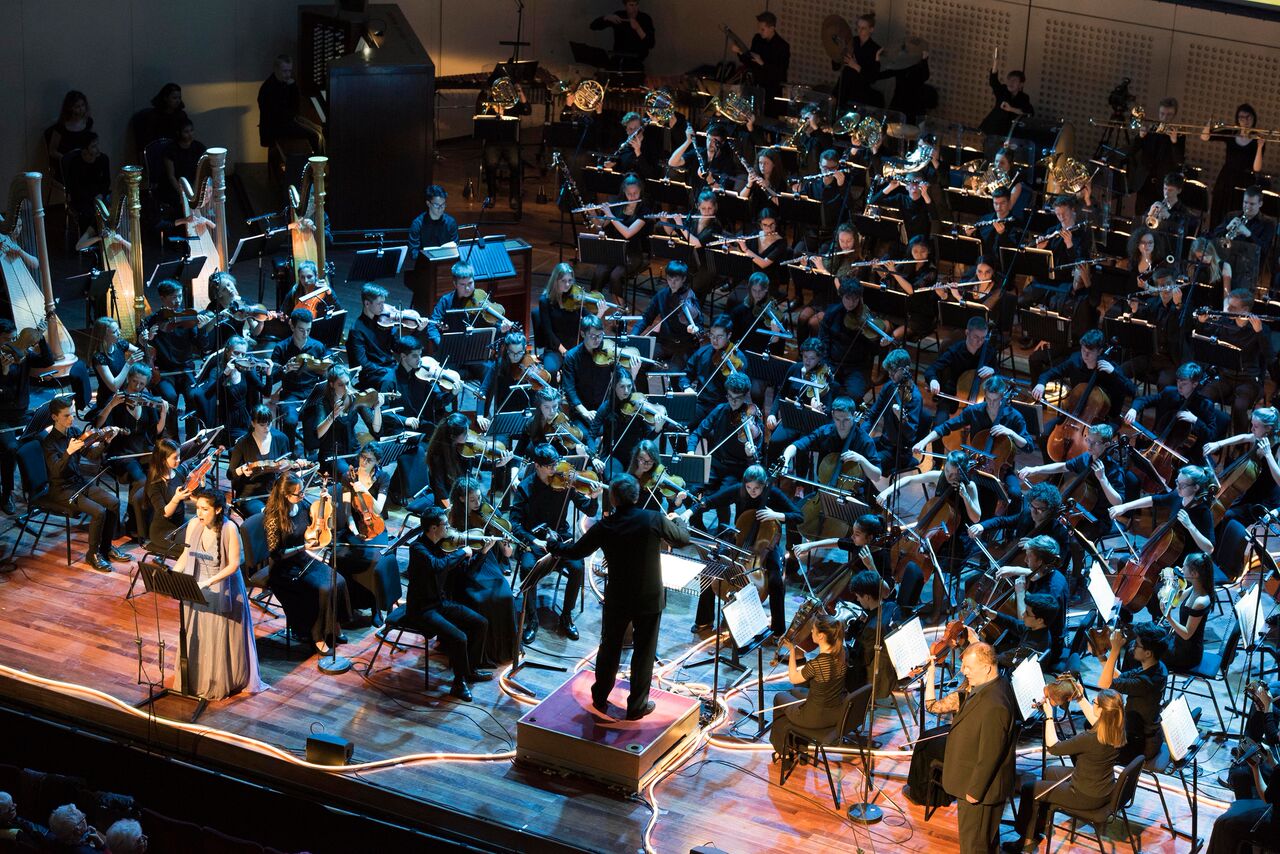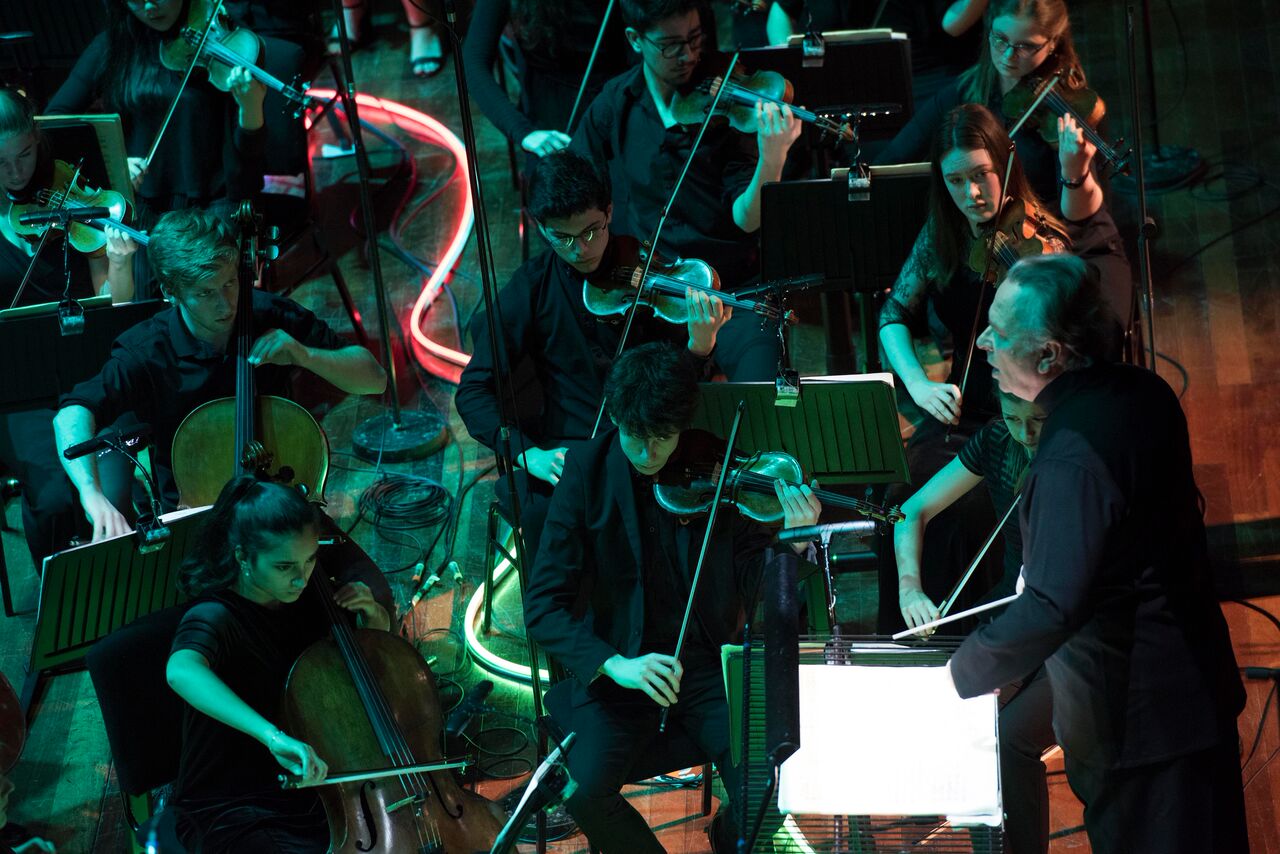National Youth Orchestra of Great Britain, Elder, Bridgewater Hall, Manchester review – maturity from teenage players | reviews, news & interviews
National Youth Orchestra of Great Britain, Elder, Bridgewater Hall, Manchester review – maturity from teenage players
National Youth Orchestra of Great Britain, Elder, Bridgewater Hall, Manchester review – maturity from teenage players
Birthday celebration includes vivid performance of first complete opera

Seventy years old and still imbued with youthful flair and enthusiasm – that’s the National Youth Orchestra of Great Britain, which pioneered new territory in its first concert of 2018 last night. The flair and enthusiasm also apply to Sir Mark Elder, who conducted the event.
It was the second part of their programme, and a concert performance, to be strict, but with a screen backdrop conveying a strangely antiquated English translation - the performance was sung in Hungarian - as well as a lighting rig to create floods of contrasting colours, four actors from the National Youth Theatre declaiming the spoken Prologue (in English) and reacting from the stage side, and geometric patterns of colour-changing LEDs on the floor (The Curious Case of the Dog in the Night Time has a lot to answer for), it did its best to be theatrical.
The young orchestral players were themselves enlisted in the cause and, when not playing, were periodically hiding their eyes, staring at soloists or screen, and lifting their instruments aloft (to represent riches), or their hands (to represent flowers). Most effective of all, Judith and Bluebeard were sung by Rinat Shaham and Robert Hayward as dramatically as is achievable in concert dress and on a stage (and, in Shaham's case, with the book in front of her on a stand – understandably so, as she had stepped in at short notice to replace the indisposed Claudia Mahnke). Their performances were what made it an opera, not just a concert. Shaham's voice is warm and multi-coloured, with a lovely quality floating in high register and great reserves of power throughout, and she portrayed the changing reactions of the young and unsuspecting bride’s first visit to the matrimonial castle, as curiosity turns to fascination, apprehension, grim determination and desperate passion. Hayward's Bluebeard was all self-possession at first, giving way to anger, fear, self-loathing and final resignation as his bloody past was revealed through the castle’s seven doors.
Their performances were what made it an opera, not just a concert. Shaham's voice is warm and multi-coloured, with a lovely quality floating in high register and great reserves of power throughout, and she portrayed the changing reactions of the young and unsuspecting bride’s first visit to the matrimonial castle, as curiosity turns to fascination, apprehension, grim determination and desperate passion. Hayward's Bluebeard was all self-possession at first, giving way to anger, fear, self-loathing and final resignation as his bloody past was revealed through the castle’s seven doors.
Sir Mark took command of the orchestral forces to wonderful effect. There’s always a danger that the NYO, with its enormous resources of player personnel, will blast anyone else off stage, but he encouraged their sound to bloom, not force, and rarely did they overwhelm the singers. The wind soloists and ensemble in particular were a joy to hear – the opening of the first scene was pure magic. The broadside in C major as Bluebeard and Judith open the fifth door, with all hands employed and organ at full throttle, was remarkable for its richness: it can only be a near-showstopping wall of sound, but this was not just spectacularly vivid, but increasingly dramatic as the scene unfolded. It was mature ensemble playing that would have been a credit to any orchestral body, not only one of teenagers who have only known each other for just a few days.  The first part of the concert was ‘straight’ orchestral pieces – both fairytale-based and both from a similar era to Bartók’s opera – and those, too, were played with remarkable finesse and skill. Liadov’s The Enchanted Lake had one of the most delicate, whispered openings I’ve heard in it – Sir Mark knows how to get the sort of sweet string tone which sounds so well in the Bridgewater Hall – and included glorious solos from the principal horn.
The first part of the concert was ‘straight’ orchestral pieces – both fairytale-based and both from a similar era to Bartók’s opera – and those, too, were played with remarkable finesse and skill. Liadov’s The Enchanted Lake had one of the most delicate, whispered openings I’ve heard in it – Sir Mark knows how to get the sort of sweet string tone which sounds so well in the Bridgewater Hall – and included glorious solos from the principal horn.
Dukas's The Sorcerer’s Apprentice had another magically gentle start and proceeded with light-footedness all the more remarkable for the numbers involved. Elder’s pacing was great fun in the opening bassoonists’ grunts, and he carried them with him through smooth and seamless tempo changes, gradually raising tension through the piece. Articulation from violins and brass was spot-on and lively, and the music ended with what can only be called an orchestral LOL.
rating
Explore topics
Share this article
Add comment
The future of Arts Journalism
You can stop theartsdesk.com closing!
We urgently need financing to survive. Our fundraising drive has thus far raised £33,000 but we need to reach £100,000 or we will be forced to close. Please contribute here: https://gofund.me/c3f6033d
And if you can forward this information to anyone who might assist, we’d be grateful.

Subscribe to theartsdesk.com
Thank you for continuing to read our work on theartsdesk.com. For unlimited access to every article in its entirety, including our archive of more than 15,000 pieces, we're asking for £5 per month or £40 per year. We feel it's a very good deal, and hope you do too.
To take a subscription now simply click here.
And if you're looking for that extra gift for a friend or family member, why not treat them to a theartsdesk.com gift subscription?

Comments
This was, quite simply, one
Fantastic performance at